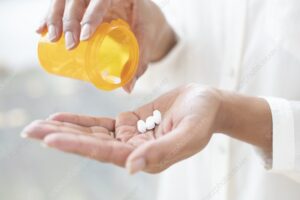Ever wondered what happens to those half-empty bottles of medicine lurking in your cabinet long after they've served their purpose? It's time to dive into the world of drug take back programs, an innovative and essential approach to managing unused or expired medications.
Within this article, we'll explore the nuts and bolts of drug take back programs, including pharmacy drug take back programs, community efforts, and the organizations breathing life into these initiatives. You'll get the scoop on how these programs operate, why they’re vital for both public health and environmental integrity, and ultimately, how they create a ripple effect of positive change across communities.
Understanding Drug Take Back Programs and Their Necessity
In today’s fast-paced world, where medications are a staple in many households, the concept of drug take back programs has never been more crucial.
 At its essence, this initiative is all about providing a safe, secure, and environmentally-friendly way to dispose of unused or expired medications. Why the fuss, you may wonder? Well, improper disposal, such as flushing drugs down the toilet or tossing them in the trash, poses significant risks.
At its essence, this initiative is all about providing a safe, secure, and environmentally-friendly way to dispose of unused or expired medications. Why the fuss, you may wonder? Well, improper disposal, such as flushing drugs down the toilet or tossing them in the trash, poses significant risks.
These risks range from water pollution and harm to wildlife to the alarming potential for prescription drugs to fall into the wrong hands. With opioids and other powerful medications contributing to addiction and overdose crises, the importance of these programs cannot be overstated. Drug take back programs are not just a tool for environmental protection—they're a critical component in safeguarding public health and safety.
How Pharmacy Drug Take Back Programs Are Leading the Charge
Pharmacy drug take back programs are at the forefront of combating medication misuse and environmental damage.
They provide a bridge between communities and safe medication disposal practices. Many pharmacies now offer dedicated bins or mail-back envelopes, where you can drop off your unused or expired medications, no questions asked. These convenient disposal options are making a significant dent in the problem of unsafe medication accumulation in homes. Moreover, pharmacies often work in collaboration with local law enforcement or environmental agencies to ensure that these medications are disposed of according to safety and environmental regulations.
By participating in these programs, pharmacies are not just offering a valuable service; they're setting a precedent for responsible health care and environmental stewardship. It’s a win-win situation: communities benefit from a safer environment and reduced drug abuse potential, while pharmacies reinforce their role as essential, community-minded health resources.
Strengthening Communities Through Community Drug Take Back Programs
Community drug take back programs serve as a cornerstone for local environmental and public health efforts, creating a communal sense of responsibility towards safe medication disposal.

- By organizing drug take-back days, communities can come together to educate one another on the dangers of improper medication disposal and offer a collective solution.
- Local government, schools, health departments, and community centers often join forces to provide accessible drop-off points for unused drugs.
These efforts not only mitigate the risk of drug misuse but also foster a culture of environmental consciousness and safety. For those looking to contribute, volunteering at or even initiating such events can be incredibly fulfilling. It strengthens community bonds, addresses a pressing public health issue, and champions the cause of a cleaner and safer environment. Remember, it takes just one person to spark change in a community, and a drug take back program could be that spark.
Organizations Championing the Cause for Safe Medication Disposal
Behind the scenes of successful drug take back programs are organizations steadfast in their commitment to safe medication disposal.
These entities, ranging from non-profits to government agencies, work tirelessly to support, fund, and promote drug take back initiatives. They provide resources for pharmacies and communities to host take back events, develop educational materials, and advocate for policy changes in pharmaceutical waste management.
By harnessing their expertise and networks, these organizations play a pivotal role in amplifying the reach and impact of drug take back programs. Their efforts not only ensure the programs’ smooth operation but also keep the public informed about the importance of responsible medication disposal. Support from these organizations means that drug take back programs can continue to grow and evolve, addressing the ever-changing landscape of prescription drug use and disposal needs.
The Broader Impact: How Proper Medication Disposal Benefits Us All
The cumulative effect of adopting proper medication disposal practices reaches far beyond individual homes or communities; it benefits society at large.
 Drug take back programs play a critical role in preventing prescription medication abuse, a concern that affects millions. By removing unused drugs from circulation, these programs directly contribute to reducing the availability of potentially habit-forming substances.
Drug take back programs play a critical role in preventing prescription medication abuse, a concern that affects millions. By removing unused drugs from circulation, these programs directly contribute to reducing the availability of potentially habit-forming substances.
Environmentally, the positive impacts are equally profound. Reduced contamination of water systems and soil helps preserve our natural resources and protects wildlife from harm. Moreover, by promoting awareness and responsible behavior, drug take back programs instill a broader consciousness about waste management and environmental preservation. The choice to dispose of medications safely is a simple yet powerful action, one that resonates with the collective well-being of our communities and the health of our planet.